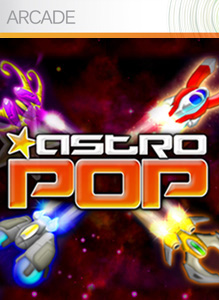 W
WAstroPop is a real-time puzzle video game developed and published by PopCap Games. The Adobe Flash version can be played online for free at several different websites, or a deluxe version can be downloaded and unlocked for a fee. The game is available for Xbox and Xbox 360 through Xbox Live Arcade. AstroPop was ported over to the PlayStation 2 in 2007 alongside another PopCap game, Bejeweled 2 which was released as a two-game compilation pack as PopCap Hits! Volume 1. The game has also been ported to cell phones.
 W
WBejeweled is a tile-matching puzzle video game by PopCap Games, developed for browsers in 2001. The first game developed by PopCap under their current name, Bejeweled involves lining up three or more multi-colored gems to clear them from the game board, with chain reactions potentially following.
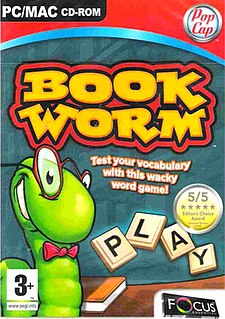 W
WBookworm is a word-forming puzzle video game by PopCap Games. From a grid of available letters, players connect letters to form words. As words are formed, they are removed from the grid and the remaining letters collapse to fill the available space. Players earn more points by creating longer words or words which use less common letters and earn less for smaller words. In November 2006, PopCap Games released a sequel, Bookworm Adventures. Bookworm was released for the Nintendo DS digital distribution service DSiWare on November 30, 2009. It has also been released on the regular Nintendo DS cartridge.
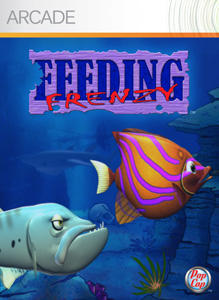 W
WFeeding Frenzy is a single-player mode and arcade-style aquatic video game written by Sprout Games, and published by PopCap Games. With an initial debut on February 11, 2004, it saw a re-release on the Xbox Live Arcade service, with versions for both the original Xbox and the Xbox 360. The Xbox 360 version, released on March 15, 2006, was the 17th most popular Xbox Live Arcade title for 2006.
 W
WGalaga is a 1981 fixed shooter arcade game developed and published by Namco. In North America, it was released by Midway Manufacturing. It is the sequel to Galaxian (1979), Namco's first major video game hit in arcades. Controlling a starship, the player is tasked with destroying the Galaga forces in each stage while avoiding enemies and projectiles. Some enemies can capture a player's ship via a tractor beam, which can be rescued to transform the player into a "dual fighter" with additional firepower.
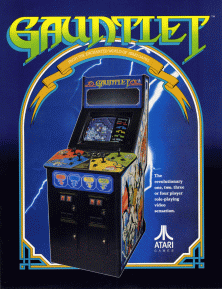 W
WGauntlet is a 1985 fantasy-themed hack-and-slash arcade game developed and released by Atari Games. It is noted as being one of the first multiplayer dungeon crawl arcade games. The core design of Gauntlet comes from 1983 Atari 8-bit dungeon crawl game Dandy, which resulted in a threat of legal action. It also bears striking similarities to the action-adventure maze game Time Bandit (1983).
 W
WGuardian is a 3D shoot 'em up video game. It was released in 1993 for the Amiga CD32 game console and later converted to the Amiga 1200. Originally previewed in the press under the name SibWing with similarities to the Super NES game Star Fox, the final game was a 3D update of the 1981 arcade game Defender.
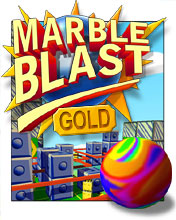 W
WMarble Blast Gold is a 2002 3D platform game. It was pre-installed on some Apple Inc. computers like the iMac, iBook, and Mac mini. It is also available for Windows operating systems as well as various Linux distributions. The sequel, Marble Blast Ultra, was released a few years later for the Xbox 360 platform with new features and improved graphics. Marble Blast XP, a version for the Net Jet online game system, has updated graphics and a marble selector. Marble Blast Gold was also ported over to the Microsoft Xbox through the Xbox Live Arcade service the following year with enhanced graphics.
 W
WMs. Pac-Man is a 1982 maze arcade game developed by General Computer Corporation and published by Midway. It is the first sequel to Pac-Man (1980) and the first entry in the series to not be made by Namco. Controlling the titular character, the player is tasked with eating all of the pellets in an enclosed maze while avoiding four colored ghosts. Eating the larger “power pellets” lets the player eat the ghosts, who turn blue and flee.
 W
WPipeline is a video game for the BBC Micro and Acorn Electron, originally published by Superior Software in 1988. It is an overhead view action role-playing game set on a mining platform. It was remade for Microsoft Windows as Pipeline Plus (2004).
 W
WPole Position is an arcade racing simulation video game that was released by Namco in 1982 and licensed to Atari, Inc. for US manufacture and distribution, running on the Namco Pole Position arcade system board. It is considered one of the most important titles from the golden age of arcade video games. Pole Position was an evolution of Namco's earlier arcade racing electro-mechanical games, notably F-1 (1976), whose designer Sho Osugi worked on the development of Pole Position.
 W
WRicochet Lost Worlds was developed by Reflexive Entertainment and is the sequel to Ricochet Xtreme. It features several new bricks, power-ups and background art. It also has the new "ring" feature, where you try to collect all the rings on each level. If you collect all five rings on every level, you become "Ring Master" and get the trophy at the end of the game. It is possible to beat the game without getting every ring, but it is less challenging.
 W
WRobotron: 2084 is a multidirectional shooter developed by Eugene Jarvis and Larry DeMar of Vid Kidz and released in arcades by Williams Electronics in 1982. The game is set in the year 2084 in a fictional world where robots have turned against humans in a cybernetic revolt. The aim is to defeat endless waves of robots, rescue surviving humans, and earn as many points as possible.
 W
WSmash TV is a 1990 arcade game created by Eugene Jarvis and Mark Turmell for Williams Electronics Games. It is a dual-stick shooter in the same vein as 1982's Robotron: 2084. The Super NES, Genesis, Master System, and Game Gear versions were titled Super Smash TV.
 W
WZuma is a tile-matching puzzle video game published by PopCap Games. It was released for a number of platforms, including PDAs, mobile phones, and the iPod.